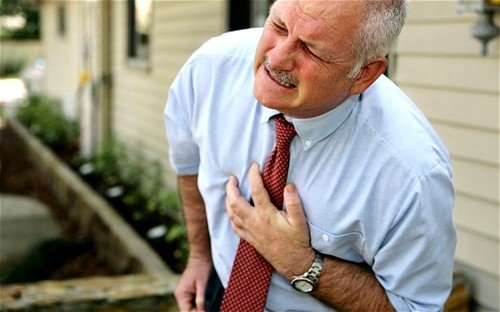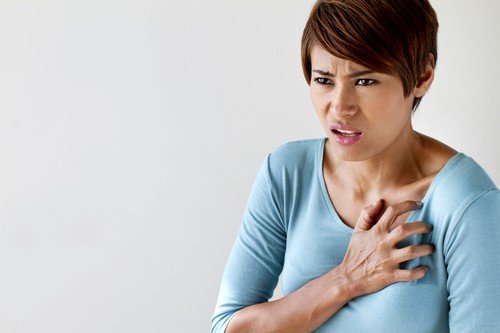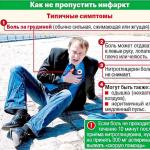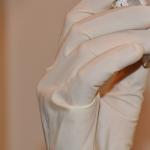A heart attack, the symptoms and first signs of which are varied, can begin suddenly, but the pre-infarction state lasts several days and can be recognized.
The symptoms of this acute disease are always associated with the appearance of a pronounced autonomic reaction, pulmonary edema, and the appearance of a fear of death. Other signs may be the most unexpected.
This disease occurs due to chronic diseases of the cardiovascular system, and the main cause of the onset of a heart attack is called an elevated level of cholesterol in the blood. There comes a time when an atherosclerotic plaque becomes the cause of the formation of coronary artery thrombosis. Then a condition occurs in which there is a cessation of blood flow to the heart muscle. The accumulated blood ruptures the artery and destroys the heart muscle. The further condition of the patient will depend on how strong the destruction of the cardiovascular system was. Severe chest pain radiating to the shoulder blade is a common symptom of an incipient heart attack, but it does not always appear. It is possible to recognize the disease only with the help of a cardiogram, and at home, you need to pay attention to changes in the state of health.
Atypical signs of the onset of the disease
The first signs of a heart attack often do not indicate the true cause. Some may feel pain on the left side in various parts of the body.
In some patients, a tooth or the entire jaw begins to ache strangely on one side, while in others, the left ear shoots or the thigh hurts. Painful attacks last for some time and disappear, so that after a while they again remind of themselves. Along with this, a person feels a strange burning sensation in the chest that does not go away for several days, and a general severe weakness. If blood pressure is measured at this moment, then the gap between the upper and lower numbers will be small, instead of the usual difference of 40 units, a difference of 15-20 units will be observed.
After the appearance of such symptoms, which in combination create a picture of a beginning heart attack, an urgent need to contact a cardiologist for therapy that prevents the development of the disease.

The onset of an acute pathological process that destroys the cardiovascular system most often begins acutely. A patient who has experienced a strong physical or psychological stress the day before, at rest begins to complain of intense pain of a compressive, pressing, burning character. Can appear:
- dyspnea;
- lack of air;
- gurgling in the chest;
- pallor of the skin;
- loss of strength;
- abdominal pain;
- nausea and vomiting;
- sudden onset of a sense of impending death and clammy sweat.
Nitroglycerin does not help in this case, and only a strong analgesic will help relieve pain. The condition can be relieved by an aspirin tablet, which thins the blood and has an analgesic effect.

A heart attack, the symptoms, the first signs of which are not always traditional, can proceed without pain. In this case, there is only severe weakness, pallor of the skin, arrhythmia, disturbances in the rhythm of the heart muscle, which can be determined by the pulse. These symptoms are constant and present in all cases of the initial stage of the disease.
Harbingers of the disease in women
Signs of a heart attack in women differ from the course of this acute disease in men, and they can be divided into precursors of the development of a pathological condition and symptoms indicating an acute development of the disease. A heart attack, the symptoms, the first signs of which in women acquire a non-standard character, are more common in women who have experienced menopause and suffer from a lack of sex hormones. The initial signs of a heart attack in women, which has not yet occurred, but threatens to develop, can be varied. These include:
- unmotivated fatigue;
- prostration;
- insomnia;
- indigestion;
- bleeding and sore gums;
- swelling of the limbs;
- arrhythmia;
- constant pain in the left shoulder;
- difficulty breathing at the slightest exertion;
- regular bouts of headache;
- increase in pressure;
- frequent urge to urinate at night.
All these signs can be regarded as violations in the work of the cardiovascular system, which lead to a heart attack.
If a woman snores in her sleep and her breathing periodically stops, this indicates a regular violation of the rhythm of the respiratory system, which leads to serious disruptions in the rhythm of the heart muscle and oxygen starvation. Such pathologies cause the development of coronary heart disease, and they often lead to a pre-infarction state.
Signs of a heart attack in a woman, which appeared long before its development, help prevent the development of a disease that significantly reduces the quality of life. After experiencing an acute illness, a person remains disabled and must constantly take a large number of medications in order to maintain the functioning of the cardiovascular system.

To prevent this from happening, ladies who have reached the age of 50 should be attentive to their health and consult a doctor whenever new symptoms appear that worsen their general health. At home, a heart attack is not treated, and only a timely call for an ambulance can save a person from death.


